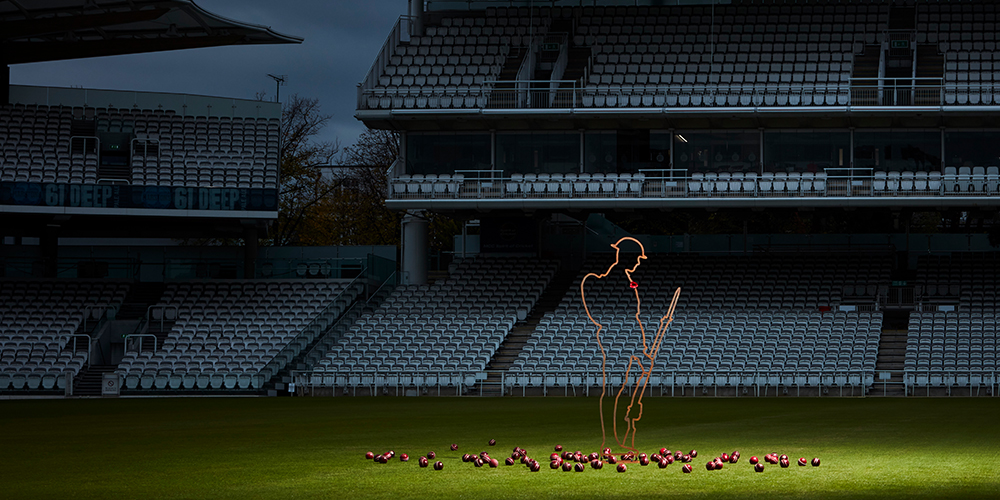
The cataclysmic conflict of 1914 to1918 was referred to as the Great War, and subsequently as the First World War after something just as horrendous was inflicted on mankind between 1939 and 1945. The ’14-18 war was defined by the seemingly interminable, blood-soaked stalemate on the killing fields of France and Belgium as patriotic fervour and optimism gave way to impatience, exhaustion and despair as the months dragged on. The human cost was beyond realistic description. Grief touched most households across the United Kingdom and in the homelands of her allies. Countless wives and mothers waited in dread for the telegram boy knocking on the door and conveying the worst possible news.
Numerous county cricketers served in the ’14-18 war. Some were killed, Test cricketers among them. Those who returned home had been changed irreparably, mentally if not physically. And if they resumed playing the game with greater freedom, it was because of their intense relief at having a peaceful normal life restored. Few cricketers of the modern era, fortunately, have ever experienced real warfare, with all its brutality, horror, hopelessness, and despair.
As we commemorate the centenary of the end of that most horrifying conflict, it is also time to acknowledge the incalculable contribution of cricketers from the length and breadth of the British Isles and beyond. It was indeed The Greater Game.
Essex:
Essex, who finished around halfway in the final County Championship table of 1918, had suffered war losses, four of them from the county 2nd XI team which played against Surrey at The Oval in the final fixture of 1914: E.C.Coleman, P.J.Hillyeard, E.R.Pallett, and C.V.Thompson. A fifth member of that side, Harold Mead, died in 1921 from wounds sustained in 1915.
Geoffrey Davies was the first Essex cricketer to die. A captain in the Essex Regiment, he fell in France on September 26, 1914, and was among the first – and there were quite a few – to be deemed a potential England player but for the European tragedy now gathering pace.
As elsewhere across England, the Essex club tried to maintain good cheer by staging matches across the county, the raising of teams no longer straightforward as cricketers joined the armed ranks. By 1917 it had become very difficult to keep the club afloat, and money from benefactors was vital to survival. The Leyton ground was headquarters. “There are good hopes that Lt-Col. J.W.H.T.Douglas [former Essex and England captain] will be able to captain the Eleven,” was the optimistic comment in 1918. He was to lead England against Australia again in the 1920s but drowned as he tried to save his father when two ships collided off the coast of Denmark in December 1930.
Essex cricketers (first-class) who lost their lives in the First World War:
Geoffrey Boisselier Davies born Poplar, London, October 26, 1892; died Hulluch, France, September 26, 1915. Captain 11th Essex Regiment. Educated Rossall. Essex 32 matches 1912-14; Cambridge University blue 1913-14. In 54 first-class matches scored 1487 runs at 18.35; 2 centuries; 43 catches; 141 wickets at 20.81; best 8 for 67.
Frank Street born Kensington, May 31, 1870; died Ovilliers la Boiselle, France, July 7, 1916. Lieutenant Royal Fusiliers. Educated Westminster. Essex 1898-99; no f-c cricket while at Oxford. In 9 matches scored 246 runs at 22.36; HS 76; 4 catches.
Henry David Keigwin born Lexden, Colchester, May 14, 1881; died near Thiepval, France, September 20, 1916. 2nd Lieutenant Black Watch. Brother R.P.Keigwin played for Essex and Gloucestershire; another brother played for Cambridge. In 11 matches scored 351 runs at 19.50, HS 37; 3 catches; 15 wickets at 31.46.
Edward Charles Coleman born Southend, September 5, 1891; died Salonika, Greece, April 2, 1917. Lieutenant Royal Field Artillery. Educated Dulwich. Essex 2 matches 1912; other match Oxford & Cambridge 1911; 14 runs at 3.50; 2 catches, one stumping.
Ralf Hubert Robinson born Stratford, Essex, June 28, 1885; died Westhoek Ridge, Ypres, Belgium, August 23, 1917. 2nd Lieutenant Rifle Brigade: awarded Military Medal. Wicketkeeper 4 matches for Essex 1912: 9 catches, 4 stumpings; 25 runs at 5.00.
James Valiant born Wavertree, Liverpool, July 17, 1884; died Gaza, Palestine, October 28, 1917. Lieutenant Royal Welsh Fusiliers. One match for Essex 1912 without success.








